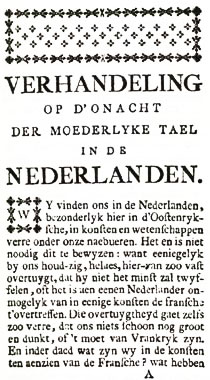

 |
 |
BroekseleBrussels was originally a Flemish town and remained so throughout the centuries, save a small French speaking elite. This changes gradually at the end of the eighteenth century, under French rule. When King William I of the Netherlands rules briefly from 1815 to 1830, he still attempts to reverse the situation. But it is only after the independence of Belgium (1830) that French gains huge popularity and becomes the lingua franca in the current Belgian and Flemish capital. originBrussels originates at the end of the seventh century, by the name of Broeksele, which means: settlement in the swamp ([old Dutch] broek). Around the year 1000, a fortress arises and in the twelfth century, the commercially successful textile centre is surrounded by a pentagonal wall. This pentagon is the centre of a very vibrant medieval guild system and it is still the heart of Brussels. from the middle ages to the separation of the Low CountriesThe original Brussels population speaks mainly Flemish dialects while Latin tends to be used in the administration. The latter shifts to the vernacular in the thirteenth century, because more and more non-clergy can now read and write. In the fifteenth century, the Burgundians set up court in Brussels, as they rule over a large part of current day Belgium and the Netherlands at the time. They would like to equal the style and class of the French court in Paris and invest heavily in the arts and architecture. The language at this court is French and this is how a small French speaking colony is established at the top. Even though the rulers change through the years, the language situation hardly does; the large majority of the population speaks Flemish and the ruling elite also uses French. This is the same in other Flemish cities for that matter. Nevertheless, the Dutch language flourishes, just like any other European vernacular in the sixteenth century and produces a rich literary oeuvre. Because of highly successful and expanding trade, there is also more contact between the North (what is now the Netherlands) and the South (what is now Flanders) so a >>standard variety of Dutch gradually develops. after 1648 After 80 years of war between the Catholic Spanish and the Dutch, followed by the separation of the Low Countries in 1648, the Northern provinces go their own way. A large number of intellectual and wealthy Flemings follow them northwards and leave Flanders somewhat drained of wealth and knowledge. As a consequence of the conflict, contact between the Netherlands and Flanders decreases and the Dutch language in the Flemish region increasingly becomes the language of the common people, while French gains in prestige. During the following Spanish and Austrian rule, Dutch nevertheless remains the language of communication in local government. In a reaction to the decline of Dutch, the Brussels lawyer Jan Baptist Verlooys writes in 1788, in his Verhandeling op d'Onacht der moederlyke tael in de Nederlanden ("Essay on the disrespect of the mothertongue in the Low Countries"): “Door ons fransch schyden wy van die midelbare geleertheyd en borgerlyke wysheid af geheel het gemeyn, onze bestgemoedde en weetgirige borgers, ambachtslieden, akkermans en onze vrouwen.” (>translation) Let's not forget that French is the language par excellence of the Enlightenment, science and culture. Antwerp and Brussels already have French theatres in the seventeenth century and French moves up among the bourgeoisie, after it has won the higher ranks of administration and the nobility. Latin on the other hand does still play an important role in education and religion, even to the extent that it temporarily slows down the Frenchification, particularly among the bourgeoisie for whom education is the only way up. French ruleWhen the French take over power at the end of the eighteenth century and exercise a strong centralised regime from Paris, Dutch is abolished in all official situations. The French pursue a conscious Frenchification policy, because they want to introduce their subjects to the ideas of the Revolution and the Enlightenment and “l’unité de l’idiome est une partie intégrante de la révolution” (>translation). As a consequence, education, the judiciary system and the administration should function entirely in French. Inscriptions on buildings have to be in French or in two languages. Publications in Dutch are discouraged and from 1811 onward, only French newspapers are allowed, with a possible Dutch translation.
question 1Do you think that the entire population switches to using French at the end of the 18th Century? Why (not)?
|